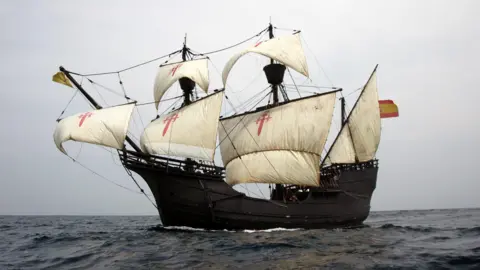Replica Spanish galleon to sail into seaside town
 Nao Victoria Foundation
Nao Victoria FoundationA replica of a 16th Century Spanish galleon will arrive on the Yorkshire coast later this month.
The Nao Victoria became the first ship to circumnavigate the globe more than 500 years ago.
The vessel left Seville in 1519 and returned to the city in 1522, having successfully sailed across three oceans and along the edge of four continents.
The full-scale replica will be moored at North Wharf Quay in Scarborough and open to the public from 26 June to 6 July.
North Yorkshire Council said the event followed a visit to the resort by the Galeón Andalucía, a replica of a 17th Century ship, last year.
Visitors will be able to hear how the Nao Victoria's crew helped change the course of maritime history under the command of Juan Sebastián Elcano.
"It is a wonderful opportunity for visitors and residents to witness maritime history up close, jumping aboard a replica of the iconic ship that was the first to ever circumnavigate the world," said Mark Crane, North Yorkshire Council's executive member for open for business.
"There was a real buzz and feel-good atmosphere around the town during the Galeón Andalucía's visit last summer, and I'm sure it will generate similar excitement when the Nao Victoria sails to our region in a couple of weeks' time."
Logistics manager of the Nao Victoria, Lupo Bathke, said the experienced crew were "looking forward to meeting residents, visitors and businesses – and helping to share the incredible story of the Nao Victoria with them".
The Nao Victoria, whose name translates as "Victory", was part of a convoy of five ships which sailed for Indonesia, but was the only vessel to return. Only 18 men out of a crew of 265 returned alive; many had died of malnutrition and scurvy, others had deserted and some were taken prisoner by the Portuguese.
The ship sank with the loss of all hands on a voyage in 1570.
Listen to highlights from North Yorkshire on BBC Sounds, catch up with the latest episode of Look North.
